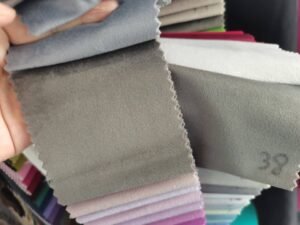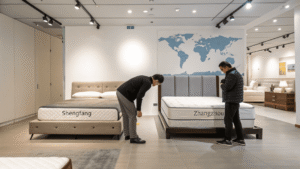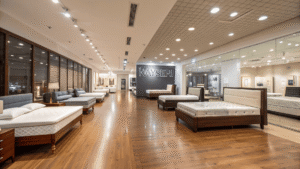Is bouclé fabric durable for bed frames?
Bouclé looks soft and stylish, but is it strong enough for daily use on bed frames? Many furniture buyers are asking this before placing bulk orders in 2025.
Yes, bouclé fabric is durable enough for bed frames, especially when using high-density polyester blends. It resists pilling, holds its shape, and performs well during shipping.

Bouclé is more than just a design trend. Its texture and strength make it one of the most practical options for modern bed frames — if you choose the right type. Let’s explore what makes it work and how to avoid the common issues.
Is bouclé fabric durable for bed frames used in high-traffic homes?
Bouclé looks soft, but can it survive in family homes with pets, kids, and constant use?
Yes, high-quality bouclé fabric is durable enough for bed frames in high-traffic homes when you use the right fabric weight and fiber content.

Breaking Down Bouclé’s Strength in Busy Households
Bouclé is made from looped yarns, which create a nubby, textured surface. That texture gives it a cozy look, but it also works as a buffer against daily friction. When used for upholstered bed frames, especially in family homes, the following points matter most:
| Factor | Impact on Durability |
|---|---|
| Fiber Blend | Polyester blends are more durable than wool alone |
| Fabric Weight | Heavier bouclé (350gsm+) resists flattening |
| Construction | Tight loops resist snagging and wear |
| Frame Padding | Foam underlay can prevent pressure on fabric |
I’ve worked with both low and high-density bouclé fabrics. The lighter ones (under 280gsm) may look fine in showrooms, but tend to stretch or show wear over time. For clients like Jack in Canada, I always recommend using a thicker fabric — 18 RMB/m and above — for better wear in high-use homes.
Does polyester bouclé resist pilling and shedding during long-term use?
Retailers often worry about customer complaints tied to fabric pilling or fluff. This is especially true with textured materials like bouclé.
Yes, polyester bouclé resists pilling and shedding better than most natural blends, making it ideal for long-term furniture use.

The Truth About Pilling and Shedding
Polyester bouclé is spun to be strong and consistent. Compared with wool or cotton blends, it has better performance on three key fronts:
1. Pilling Resistance
Polyester fibers are smoother and stronger. They don’t break and fray easily, which means fewer pills form on the fabric surface.
2. Shedding Behavior
Bouclé made from synthetic yarns doesn’t drop fluff the way cut-pile velvet or chenille might. It stays neat longer, especially when combined with tight loops.
3. Cleaning and Maintenance
Polyester bouclé is easier to vacuum and spot clean. That reduces complaints and return rates from end customers.
For long-term use — especially for showrooms or online stores — I suggest choosing a bouclé fabric with at least 70% polyester content. You’ll notice the difference after just a few months of use.
Is bouclé upholstery prone to damage during vacuum packaging and shipping?
Shipping is always a big question for furniture exporters. Can bouclé survive compression, folding, and long routes?
No, bouclé is not prone to damage during vacuum packaging, but proper material and method matter.
How to Ship Bouclé Beds Without Issues
Bouclé’s looped texture makes it slightly more sensitive to crushing than flat-woven or tight velvet fabrics. However, with the right handling, it performs very well in vacuum-sealed packaging.
| Shipping Step | Best Practice |
|---|---|
| Vacuum Packing | Use dual-layer vacuum bags with corner protection |
| Fabric Weight | Choose 350gsm+ fabrics for better shape recovery |
| Box Design | Use 5-layer corrugated cartons to prevent outer pressure |
| Inspection | Check post-shipping compression marks before delivery |
I’ve seen customers complain about compression lines on bouclé when suppliers use low-density foam or thin fabric. That’s avoidable. We always recommend combining air column protection inside the box with heavier bouclé to prevent issues.
Which bouclé blend (polyester vs wool) is best for cold, dry markets like Canada?
In Canada, dry winters and indoor heating create unique challenges for fabric selection.
Polyester bouclé is better than wool blends for cold, dry markets like Canada due to its anti-static, low-moisture behavior.

Cold Climate Performance: Wool vs Polyester Bouclé
Wool absorbs moisture and tends to react to dry air with static buildup. Polyester, on the other hand, stays stable. Let’s compare the two in key areas:
| Feature | Wool Bouclé | Polyester Bouclé |
|---|---|---|
| Moisture Reaction | Absorbs moisture, prone to mildew | Resists moisture and mold |
| Static Electricity | High static in dry air | Low static, ideal for winter use |
| Cleaning | Requires delicate handling | Easy to wipe or vacuum |
| Price Range | 25–40 RMB/m | 13–28 RMB/m |
In my experience working with Canadian retailers like Jack, we almost always recommend polyester blends. They reduce the chance of returns and increase product satisfaction — especially for customers who don’t want to do fabric maintenance during harsh winters.
What are the pros and cons of bouclé bed?
Every fabric has trade-offs. Bouclé is no exception. Some love the cozy look. Others worry about trend fatigue.
Bouclé beds offer softness, style, and surprising durability, but they may require more dusting and careful packaging.

Pros of Bouclé Beds
- Soft, cozy appearance
- Great for minimalist or modern designs
- Doesn’t shed like velvet
- Long-lasting when using high-resilience fabrics
- Ideal for seasonal campaigns (fall/winter collections)
Cons of Bouclé Beds
- May trap dust more than smooth fabrics
- Slightly sensitive to crushing during shipping
- Trendy look may not appeal to traditional buyers
- Requires vacuuming to keep loops clean
If your main buyers prefer light-touch cleaning or classic aesthetics, bouclé may need additional education at the point of sale.
What fabric is best for a bed frame?
Retailers always ask — what’s the best fabric overall for beds?
There’s no one-size-fits-all. For modern styles, bouclé and linen-look polyester blends are top choices in 2025.

Comparing Popular Upholstery Fabrics
| Fabric | Durability | Style | Price | Maintenance |
|---|---|---|---|---|
| Bouclé | High | Cozy, Modern | Mid | Medium |
| Velvet | Medium | Luxe, Glam | Low to High | Medium |
| Linen-look Poly | High | Clean, Versatile | Low | Low |
| Suede | Low | Traditional | Mid | High |
Bouclé fits best in mid to high-end collections. If your product line includes entry-level or budget SKUs, consider using flat polyester or linen-style textures instead.
What are the cons of bouclé fabric?
Let’s be honest — bouclé isn’t perfect for everyone.
The main cons of bouclé fabric are its dust retention, shipping sensitivity, and limited appeal in ultra-classic interiors.

When to Be Careful With Bouclé
Here are scenarios where bouclé might not be your best choice:
- High-humidity areas: loops can trap moisture
- Low-end markets: customers may not understand the texture
- High-polish showrooms: surface may look “casual” compared to velvet or leather
- Ultra-clean interiors: needs more vacuuming to look perfect
That said, in 2025, most Canadian and European retailers still feature bouclé as a go-to for seasonal releases and display pieces.
Conclusion
Bouclé is not just a trend — it’s a reliable choice for bed frames when you pick the right blend, thickness, and packaging method.



